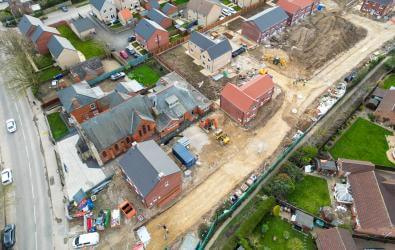Jeremy Hunt announced his full Autumn statement today in a plan dubbed the ‘budget for growth’. Comprising 110 different ‘growth measures’ the statement includes changes to personal tax, wages and benefits, business tax and economic incentives.
In the run-up to the statement announcement, there were several rumours around potential property tax cuts - particularly to stamp duty and inheritance tax - that unfortunately have not materialised.
That said, support for private renters and planning - as well as further incentives designed to encourage economic growth - will likely have a knock-on effect on homebuyers throughout the UK.
Below we explore some of the key property-related highlights from the Autumn Statement, alongside some of the other points related to homebuyers.
Renting
In one of the largest points of the 2023 Autumn Statement, the cap on the Local Housing Allowance has been increased to the 30th percentile of local market rents which should give low-income renters a boost.
By unfreezing the Local Housing Allowance, renters can now claim support for their current local rent prices - something that hasn’t been possible since it was frozen in 2020.
It’s expected that the increase will give over 1.6 million households a potential £800 extra in support over the next year.
Hunt said: “Because rent can constitute more than half the living costs of private renters on the lowest incomes… unfreezing local housing allowance was an urgent priority.”
Housebuilding
Another key part of the statement covered house building and changes to planning. Within the statement, Hunt promised to ‘unlock’ new home building by investing £110 million to deliver ‘high-quality, nutrient mitigation schemes unlocking 40,000 homes’.
Likewise, £450 has been allocated to the local authority housing fund to help deliver 2,400 new homes.
Finally, an additional £32 million has also been pledged to “bust the planning backlog” and develop fantastic new housing quarters in London, Leeds and Cambridge.
In terms of planning, Hunt pledged to consider new development rights that would allow any home to be divided into two flats - provided the exterior is unaffected.
According to Tom Nicholson, senior adviser at Outra - a market-leading data science company - the changes represent an optimistic first start: “Hearing the Chancellor address the planning backlog today was somewhat promising… the housing crisis isn’t just about numbers; it’s about overcoming systemic hurdles. We must bridge intentions with actions for tangible change. A robust framework is essential, with mandatory housing targets for local plans, streamlining planning, reducing risks and enabling prompt home construction.”
How else will the Autumn Statement help homeowners?
The housing market is often considered an extension of the economy. While there haven’t been any specific points laid out in the statement related to homeowners, anything that supports higher take-home pay directly supports buyer confidence and improves affordability challenges.
As such, cuts to Class 2 National Insurance for self-employed workers - amongst other wider tax cuts - are generally welcomed by the housing market.
While some experts were expecting support for first-time buyers, stamp duty cuts for downsizing buyers and changes to inheritance tax, it now seems likely these points will materialise next year.
Regardless of this relatively low level of new support, the housing market continues to show its resilience and price falls have been significantly better than expected.
What other key points were in the Autumn Statement?
Some of the other key headlines included in today’s Autumn Statement include:
• Employee national insurance contributions will drop from 12% to 10% as of January 2024. It’s expected this will affect around 28 million people and save someone - on an average salary - around £450.
• According to the Office for Budget Responsibility, forecasts suggest the economy will grow by 0.6% and 0.7% next year. It is 1.8% larger than it was before the COVID-19 pandemic.
• Inflation is expected to fall by 2.8% by the end of 2024 - down from 11.1% last year when Hunt entered office.
• It’s expected inflation will stay “higher for longer” and that it will not drop to the Bank of England’s target of 2% until mid-2025.
• Higher inflation will keep interest rates elevated, the OBR says. It expects the central bank’s key interest rate to stick at about 4% until 2028, rather than drop to 3%, as it predicted in the spring.
• The ‘national living wage’ will increase to £11.44 an hour from April and be extended to 21-year-olds.
• The state pension is increasing to 8.5%.
• ‘Class 2’ national insurance contributions are being abolished for self-employed workers. This will cut taxes for 2 million people. ‘Class 4’ contributions will also be cut by 1%. Together, this is expected to be worth around £350.
• He says there will be a new “investment zone” in Wrexham, Wales, in a bid to increase employment in the area. There will be three others in England: Greater Manchester, and the West and East Midlands.




